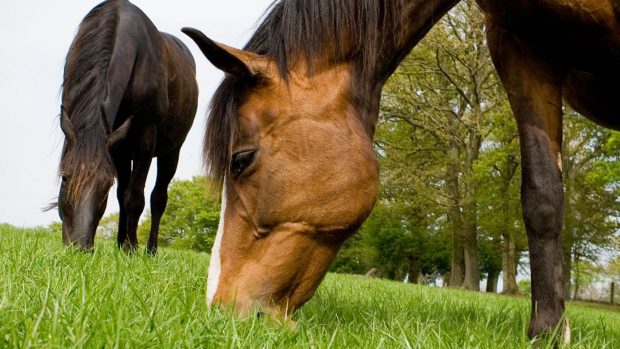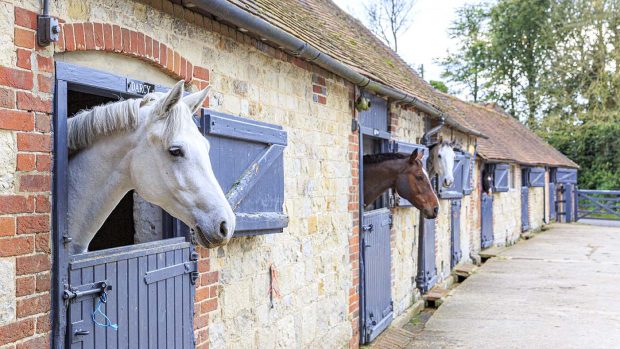Loaning a horse can provide flexibility and be a rewarding experience for all parties, with the horse, owner and loaner all benefiting, but it is not without its potential pitfalls.
Loaning your horse out can be a great option for owners who face unexpected changes or have limited time, allowing their horse to remain active and well-cared for without the need to sell.
It can also be the perfect solution for a much-loved pony that a child has outgrown or for an older horse that can no longer compete in its usual discipline, but isn’t ready for retirement.
This was Jo Ward’s situation when her beloved warmblood Leo’s hocks became resistant to medication at the age of 15 and the vet advised he should continue hacking only.
“I was 24 and moving to London for work, so I thought I’d see if anyone might want to loan him before I put him on retirement livery,” says Jo, who placed an advert online with no great expectations.
“I was sceptical because Leo isn’t your standard happy hacker,” explains Jo. “He is not keen on hacking alone, finds unnecessary things spooky but is a joy to do on the ground.”
Scarred by a previously unhappy loan, Jo decided Leo would only go to someone within an hour’s drive who was happy for her to visit regularly.
Luckily, the perfect candidate appeared in Fiona Burnard, a BHSAI looking for a fun horse to ride out alongside her teenage daughter.
Jo appreciated Fiona’s setup, requested references, and ensured a proper contract was established. She also retained responsibility for Leo’s insurance and veterinary costs for his chronic conditions. Fiona enjoyed riding Leo around the scenic Wiltshire countryside for four wonderful years before agreeing to provide him with a permanent home when he fully retired in his 20s.
However, not all loan arrangements work out so well. Cases where horses have been sold on while out on loan highlight one of the problems associated with loaning without a written agreement. There have also been cases where the loaner has found themselves abandoned to care for a horse that they don’t own beyond the agreed loan period.
It’s a vulnerable position to put yourself in either way, which is why the British Horse Society (BHS) strongly advise that a mutually acceptable written agreement is drawn up.
Wendy Peckham of the BHS says: “Frequently loan arrangements are made by word of mouth only, and when something goes wrong it can be the animal that ultimately suffers.”
The BHS has drawn up a free-to-download sample agreement that can be used as a basic template that can – and should – be tailored to meet specific requirements and circumstances of a loan agreement.
“Having an agreement in black and white felt like protection for both parties – we were two complete strangers who have become really good friends,” added Fiona.
How does loaning a horse work?
In essence, a horse loan is a temporary agreement where a rider borrows a horse from its owner for a set period under specific conditions. While it eliminates the upfront cost of buying, it still requires taking on many of the same responsibilities as ownership.
Horse loan agreements come in various forms, outlining how responsibilities and costs are shared between the owner and the loanee.
A full loan places all financial and caregiving responsibilities squarely on the loanee’s shoulders. In most cases, the horse moves to a yard chosen by the loanee, allowing them to manage the horse’s care and routine independently. This arrangement is ideal for those seeking the experience of horse ownership without having to purchase a horse upfront.
In a part-loan arrangement (also known as sharing a horse), the loanee shares the horse’s care with the owner, often on specified days. The horse typically remains at the owner’s yard, and the loanee contributes to its upkeep, covering costs such as livery, feed, or farrier services. This is a great option for riders who want to enjoy regular access to a horse without the full financial burden.
Loaning a horse with a view to buying is an arrangement where a horse is temporarily loaned to a prospective buyer, allowing both parties to ensure the horse is a good match for the new owner before completing the sale. During this time, the horse may remain at its current yard or move to the buyer’s chosen yard, depending on the agreement. Clear terms for care, costs, and duration, as well as under what circumstances the horse can be returned, should be outlined in a written agreement to protect both the buyer and seller.
By law, a horse’s passport must always stay with the horse. So, if a loanee relocates the horse to a different yard, they are also required to ensure the passport accompanies the horse. In legal terms, an equine passport is not proof of ownership.
How much does it cost to loan a horse?
While loaning a horse eliminates the initial purchase cost, the ongoing financial responsibilities remain the same. However, who pays for what varies widely based on the type of loan agreement.
In a full loan, costs typically include feeding, worming, farrier visits, dental care, vaccinations, bedding, public liability insurance, transport and livery fees.
According to the latest British Equestrian Trade Association (BETA) survey, on average during 2023 owners spent £3,092 (£257 per month) on livery alone or £1,548. But costs are rising and in some areas of the country, it’s much more.
Costs for part loans vary even more but typically include a contribution to the horse’s upkeep commensurate with the percentage of responsibility you’re taking on. But to comply with legal requirements, agreements should clearly specify that contributions are intended to cover the horse’s upkeep costs, not as payment for hiring the horse. Additionally, they should not suggest that the owner is providing professional training or instruction.
Who pays for vet bills when a horse is on loan?
The most common disputes in loan agreements arise from misunderstandings about financial responsibilities, in particular regarding who is responsible for veterinary fees.
Vet bills for non-chronic conditions tend to be the responsibility of the loanee. But everyone’s circumstances are different, which is why it’s so important to cover all bases in your loan agreement, including what authorisation the loanee has in the event that a vet advises a horse to be put down.
These can be uncomfortable conversations to have – especially with someone you might not know well – but they’re essential.
It’s also important to note that as a loanee you can take out additional insurance on a horse you don’t own for peace of mind, however, there are often limitation periods applied to the start of new policies to prevent pre-existing conditions being claimed for.
Loaning a horse for the first?
Here are some things to consider when loaning a horse for the first time:
Top tips for loanees
- Make sure you have done your sums. Loaning a horse might appear to be a cheap option, but the only money you save is the purchase price. The ongoing costs of keeping a horse will be exactly the same
- Make sure you have adequate insurance and don’t be offended if the horse’s owner asks to see the policy
- Have a written agreement which clearly explains who is responsible for what drawn up before taking the horse home. Although it doesn’t have to be written by a solicitor, it is advisable
- The owner is likely to want to see where their horse will be kept, before agreeing to the loan so if you are planning to put the horse on livery have this already organised
- Consider getting the horse vetted. If the horse has an underlying problem it could result in expensive vet bills
- Be sure to discuss with the owner what would happen if a serious accident or disease means the horse would have to be urgently destroyed
- Get written permission from the owner about the type of activities the horse is and is not allowed to take part in and make sure these activities are covered by the insurance
- If you’re moving yards, take the horse’s passport with you
Top tips for owners
- Under no circumstances should a horse be put on loan or out to lease if it is suffering any kind of illness or lameness. The horse should be sound and fit for the purpose for which it is being loaned or leased
- Consider the reasons why you are loaning the horse out. If the horse is old or infirm other options may be more suitable, so do discuss your plans with your vet
- Always thoroughly check out the person and home where your horse will be going. Ask for references and follow them up
- Never allow your horse out on loan without a written agreement, which states that you retain the ownership of the horse at all times
- If you don’t want the horse to take part in particular activities, such as hunting or polo, make this clear and include it in the written agreement
- Discuss what will happen if the horse becomes badly injured or ill and needs to be put down on humane grounds
- The loan agreement should include terms under which the horse can be returned to you by the loaner, or under which you can ask for the horse to be given back
- Communicate – it’s important to remain involved and responsible
- To stay up to date with all the breaking news throughout London International and more, subscribe to the Horse & Hound website
You may also be interested in:

How make sharing a horse work, plus important things to be aware of…

The expense of horses: should I buy, share or have lessons?

Considering giving up horses? You need to read this first…





